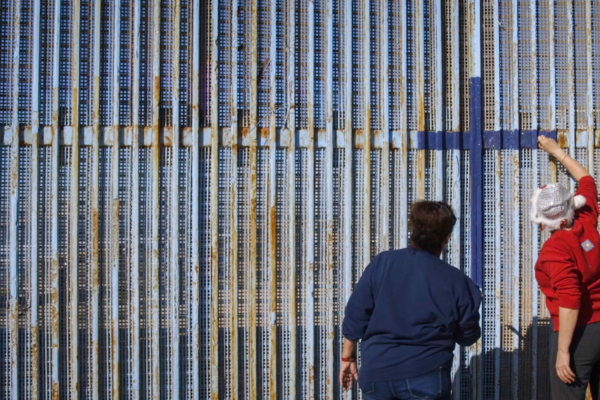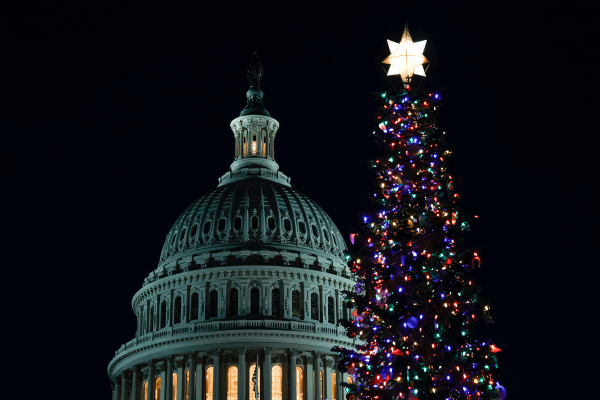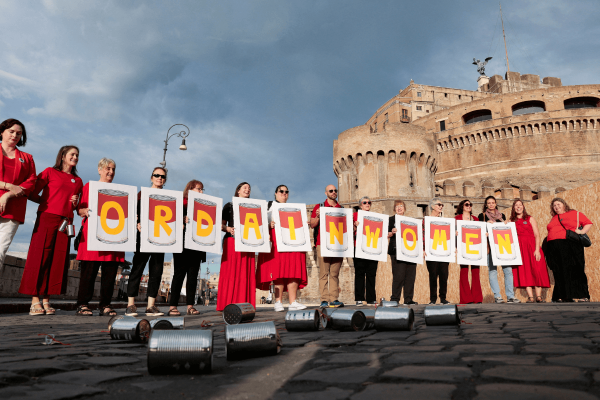That’s what Jesus said, eight times in the New Testament: “Be not afraid.” In fact, “do not be afraid” is the most often repeated command in the Bible. And if you look at the whole Bible, you will find 365 scriptures that command us to not fear or be afraid in reaction to the world, people, or events around us. That’s enough for one reflection for every day of the year!
Why does the God of the Bible, the angels who announce the birth of Christ, then Jesus himself, keep telling us, again and again, not to be afraid or to live in fear? Perhaps it is because our human nature makes us fearful. And what we most easily fear are the people who are “different” than us. Fear of “the other” is a very common human trait.
In Matthew 14:27, Jesus speaks up clearly: “Take courage. It is I. Do not be afraid.” That brings us to the Matthew 25 text that has been repeatedly raised during this Advent season as we have again seen the brutal treatment of asylum seekers coming to this country: “I was a stranger, and you welcomed me.” Later in the same scripture, Jesus warns of the inverse: “I was a stranger, and you didn’t welcome me.” Jesus identifies with those who are hungry, thirsty, naked, a stranger, sick, or a prisoner. It was me, Jesus says, “As you have done it (or not done it) to one of the least of these, you have done it to me.” Don’t be afraid, it is I, Jesus says to his disciples in a boat on a stormy sea.
Last weekend, I was at the U.S.-Mexico border between San Diego and Tijuana for a posada liturgy. The border service of this centuries-old Advent liturgy is called La Posada Sin Fronteras, or Posada Without Borders, and this year was its 25th anniversary. The service was a powerful experience for me, as we joined in the liturgy with hundreds of ecumenical, multilingual, and multiracial pilgrims on both sides of the border — singing to each other the lovely words of Mary and Joseph asking for shelter from innkeepers, who keep refusing them until the last one welcomes them in. We sang Christmas carols and recited the names of migrants who have died, as crosses and prayers were lifted up.
We began with a press conference, with many California and Mexican media present, calling for more compassionate and humane policies toward those whom Jesus called us to welcome. We then pilgrimaged to the border in a hike that was both focusing and taxing over three miles of mostly thick sand along the beach, as just a very small glimpse of what thousands of refugee families have been experiencing for many months as they journey with their children and belongings over thousands of miles to this border.
In many past posadas over this quarter century, pilgrims have been allowed to touch each other’s fingers through the fences, throw candy to children over the fence, and even pass tamales back and forth to celebrate a meal together as part of the tradition. This year, the scene was much more militarized, as those of us on the U.S. side were kept far away from the fence with Border Patrol trucks slowly driving between. But being able to sing back and forth, with the words of the posada liturgy coming across the fence, was a very moving moment for me.
This Tuesday was International Migrants Day — and here in Washington, D.C., Sojourners was involved in a second observance of Las Posadas. We and many allied groups walked to Congress and hand-delivered a letter signed by more than 3,000 faith leaders and Sojourners supporters calling for the timely processing of asylum interviews at the border, secure funding for humane practices and policies, and a continued to pursuit of comprehensive immigration reform — and shared a tamale meal afterwards.
In the context of this season, it is indeed important to be reflect on these political issues theologically. The president, his administration, and his party allies are deliberately and directly pursuing policies of fear in relationship to asylum seekers, immigrants, and refugees. “Be afraid!” Donald Trump proclaims. Trump campaigned on fear again during the midterm elections; he governs on fear; he makes immigration policy based on fear. We’ve seen this play out in a couple of ways:
- propagating rhetoric aimed at stoking fear of immigrants, and
- treating asylum seekers so brutally — separating children from their parents or putting whole families in prison detention centers — as an attempt to deter immigrants from coming to America.
Jesus says, “welcome the stranger." Donald Trump, in great contrast, enacts policies that inflict trauma, pain, danger, and even death on the ones Jesus tells us to welcome. And the evangelical Christian leaders who support Donald Trump have absolutely nothing to say. Ask them this question, “What about Jesus?”
To the objections those white evangelical supporters of the president might raise, there’s a fairly clear response we can give as people of faith: We recognize the importance of upholding just laws and protecting our border, but migrants have a legal right to seek asylum and pose no real danger to America. Beyond the letter of the law, as Christians we are called to uphold the higher law of imago dei, that we are all made in the image and likeness of God, and the command of Matthew 25, that we treat the most vulnerable as we would treat Christ himself.
This week as Christians all over the world prepare to celebrate the birth of Jesus, which for many of us includes gathering with our family members, the president of the United States took us to the brink of shutting down a big chunk of the federal government, which would have forced tens of thousands of public servants to work without pay or putting them on essentially involuntary unpaid leave, just in time for Christmas. The threats, which he ultimately backed down from, all hinged on funding for him to build his promised border wall. The Trump administration now says it will look for the president’s $5 billion for the wall in “other agencies.”
A rough estimate of the total cost of the wall and the number of miles of wall that would be built suggests that Trump’s wall would cost about $30 million per mile. A top government official who knows the budget line by line detailed to faith leaders last week all the programs that effectively assist low-income families that would need to be cut to pay for Trump’s wall — a wall of fear and of hate.
As I wrote last year (when the government also nearly shut down over wall funding in April 2017), there’s no practical case for this wall:
A 2015 government study indicated that the bulk of illegal drugs that enter the U.S. come hidden in trucks through established border checkpoints, so a wall wouldn’t keep drugs out of the country as Trump claims. As for undocumented immigrants, the Pew Research Center tells us that not only has immigration from Mexico been falling for years, long before Donald Trump took office, but at this point more Mexican immigrants are leaving the United States than are coming in each year.
The communities most impacted by border crossings — those closest to the border, understand that the wall makes no practical or moral sense: There isn’t a single member of Congress that represents a district on the U.S.-Mexico border who supports building a wall.
The public doesn’t support it either: According to a recent poll, “By a 21-point margin — 57 percent to 36 percent — Americans think the president should compromise on the wall to avoid a government shutdown, rather than stand firm.” However, two thirds of Republicans believe he should shut down the government if necessary to secure wall funding.
This is an ungodly wall, being pushed by an ungodly man, for deeply ungodly reasons, and we must make it clear that we as Christians will never allow it to be built on our watch.
Blessed Christmas.
Got something to say about what you're reading? We value your feedback!






